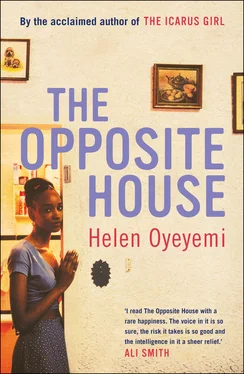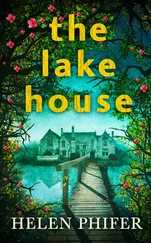Helen Oyeyemi - The Opposite House
Здесь есть возможность читать онлайн «Helen Oyeyemi - The Opposite House» весь текст электронной книги совершенно бесплатно (целиком полную версию без сокращений). В некоторых случаях можно слушать аудио, скачать через торрент в формате fb2 и присутствует краткое содержание. Год выпуска: 2008, Издательство: Bloomsbury UK, Жанр: Современная проза, на английском языке. Описание произведения, (предисловие) а так же отзывы посетителей доступны на портале библиотеки ЛибКат.
- Название:The Opposite House
- Автор:
- Издательство:Bloomsbury UK
- Жанр:
- Год:2008
- ISBN:нет данных
- Рейтинг книги:4 / 5. Голосов: 1
-
Избранное:Добавить в избранное
- Отзывы:
-
Ваша оценка:
- 80
- 1
- 2
- 3
- 4
- 5
The Opposite House: краткое содержание, описание и аннотация
Предлагаем к чтению аннотацию, описание, краткое содержание или предисловие (зависит от того, что написал сам автор книги «The Opposite House»). Если вы не нашли необходимую информацию о книге — напишите в комментариях, мы постараемся отыскать её.
The Opposite House — читать онлайн бесплатно полную книгу (весь текст) целиком
Ниже представлен текст книги, разбитый по страницам. Система сохранения места последней прочитанной страницы, позволяет с удобством читать онлайн бесплатно книгу «The Opposite House», без необходимости каждый раз заново искать на чём Вы остановились. Поставьте закладку, и сможете в любой момент перейти на страницу, на которой закончили чтение.
Интервал:
Закладка:
At lunchtime I always struggled with Chabella’s sandwiches. Like all her food, Mami’s sandwiches are works of slow-cooked love. They’re ostentatious and difficult to eat in public — by the time you curl your fingers around one and take a bite, the marinated pork or chicken has already spilled out from atop the onion- and tomato-stuffed cocoon of wheat-rich bread, and a shower of sandwich and salsa sauce spatters your hands and your lap. You can’t even lick your fingers as you would leaning on the table at home because you feel guilty, you feel embarrassed, you feel mad to have brought in such a luxury bed of a sandwich when everyone else is making do with the equivalent of string hammocks.
Amy Eleni was probably equal to the challenge of a Chabella sandwich — I had never seen her blush. She made no attempt to customise her uniform; she just let it hang off her in limp monochrome. Her hair was longer, then. She let it all curl into a big, burnt-yellow shock, thick enough for me to pile up on her head later in a crown of Senegalese twists. But at that time everyone, including me, ignored her insistence on being addressed at all times as ‘Amy Eleni’. We just kept calling her ‘Amy’, which sometimes forced her to shout ‘Die before your parents do!’ and slap her rump in the direction of the person who was disregarding her wishes. The rumours about her were numerous, but the predominant one was that Amy had three boyfriends and was having sex with all of them on a timetabled basis.
One day Amy Eleni, her most devastating smile in place, beckoned me away from the centre of my lunch circle, where I had been sitting with one foot up on the edge of another girl’s chair laboriously washing pink varnish over her fingernails. I went over to Amy Eleni with the nail varnish still in my hand, and she took it from me and screwed the lid back on. The first thing she told me, with breathtaking serenity, was that we should be best friends because we were both pretty, and pretty girls always found it difficult to make real girlfriends who wouldn’t turn Judas on them. The second thing she told me was that I absolutely had to call her Amy Eleni; Eleni was her middle name but she took her Cypriot heritage seriously and found it hard enough to keep up when she looked like a common-or-garden variety English kid and had a surname like Lang. Then she mentioned that at her Holy Communion she had spat out the Host into her hand because she didn’t believe in all that Jesus crap, and that the following Saturday she had snuck back into the church while the priest was taking confession and had tried to make the figurine of the baby Jesus beat upon a drum to prove his reality. She’d then broken the figurine because it hadn’t. I stared at her and smiled, timid, aghast. She burst out laughing. She named a book and said I really needed to read it.
Our favourite film is Vertigo . Amy Eleni and I must watch it seventeen or eighteen times a year, and with each viewing our raptness grows looser and looser; we don’t need the visuals any more — one or the other of us can go into the kitchen halfway through and call out the dialogue while making up two cups of Horlicks. From the minute you see empty, beautiful, blonde Madeleine Elster, you know she is doomed because she exists in a way that Scottie, the male lead, just doesn’t. You know that Madeleine is in big trouble because she’s a vast wound in a landscape where wounds aren’t allowed to stay open — people have to shut up and heal up. She’s in trouble because the film works to a plan that makes trauma speak itself out, speak itself to excess until it dies; this film at the peak of its slyness, when people sweat and lick their lips excessively and pound their chests and grab their hair and twist their heads from side to side, performing this unspeakable torment.
When things are serious and either Amy Eleni or I need to beat our personal hysteric, the informal code is to seize your head and twist coils of your hair around your fingers and groan, ‘I’m not mad! I’m not mad! I don’t want to die!’ And if you have a friend who knows, then the friend grabs her head too and replies, ‘There’s someone inside of me, and she says I must die!’ That way it is stupid, and funny, and serious.
Our hysteric is the revelation that we refuse to be consoled for all this noise, for all this noise, for the attacks on our softnesses, the loss of sensitivity to my scalp with every batch of box-braids. Sometimes we cannot see or hear or breathe because of our fright that this is all our bodies will know. We’re scared by the happy, hollow discipline that lines our brains and stomachs if we manage to stop after one biscuit. We need some kind of answer. We need to know what that biscuit-tin discipline is, where it comes from. We need to know whether it’s a sign that our bones are turning against the rest of us, whether anyone will help us if our bones win out, or whether the people that should help us will say ‘You look wonderful!’ instead.
Why can’t we kill this panic, or do the other thing and make it mute?
My heart bounces on the end of a string whenever I hear the names of Chabella’s Orishas. Those gods who trip us up, then haul us up, then string us up, who understand that it hurts, but also understand that it needs to. They’re deadly friends from stories, their names braided into explanations for the heavy nights edged with uncertain light like dull pearls, the nights when Chabella would wake me up at hourly intervals, pleading with me to sip a little, just a little, of one herbal tincture or another. Nights when I protested with all my soul to be allowed to sleep instead. That is how the Orishas are real to me: Olorun, the father god, greatest of gods, god without a face; Ochun the beautiful, fertile dancer; wise man Orumbila; Yemaya of the ocean; fiery Chango; wily Echun-Elegua; reaper Iku; Ogun, the man of iron.
They make Papi impatient. ‘Those are Yoruba gods,’ he tells Mami. ‘And you are not Yoruba. You are a black Cuban. There is a difference. For an intelligent person, you really surprise me. To us, these gods are historical artefacts.’
Papi rubs his head bemusedly with both hands and tries not to laugh during the midnight Masses and Easter vigils Mami drags us to. He’s not entirely in the wrong; it’s easy to laugh at Mass in a Catholic Church where everyone is so straight-faced and ceremonious, even if they’re just shaking a stick or something. Once when Mami, overcome with tears as a sung Gloria confirmed that Christ has risen, whispered to Papi did he feel something, he squeezed her hand with both of his. He muttered to me, instead of to her, ‘I’m seventy-four, yes, but I’m still lucid.’
Papi’s irritation must begin as soon as he steps inside the house. Where there would usually be a lump of shaped brass, Mami and Papi’s coat stand has a host grinning from its top — a concrete skull, eye sockets filled with dull shells. The shells are eyes for Elegua to look through — Echun-Elegua, the trickster god, who protects us from the works of other, inferior tricksters. He hides behind the door of his ramshackle, crazy-beamed house, watching the people who hurry up and down his crossroads like so many dusty-backed beetles. Some people are speeding past so quickly, so intent on their maps, that they don’t even notice Elegua’s house rocking nonchalantly on the heels of its stilt-feet like Baba Yaga’s hut getting ready to run.
Mami says of Elegua, ‘If you know anything about him, you fear his kindness.’
When Chabella first became a Santero, Elegua chose her for his own — unusual that he should have chosen a woman. But then perhaps my mother’s family is favoured. My great-grandmother, Bisabuela Carmen, was a female babalawo, a Santeria priest.
My middle name is Carmen.
Читать дальшеИнтервал:
Закладка:
Похожие книги на «The Opposite House»
Представляем Вашему вниманию похожие книги на «The Opposite House» списком для выбора. Мы отобрали схожую по названию и смыслу литературу в надежде предоставить читателям больше вариантов отыскать новые, интересные, ещё непрочитанные произведения.
Обсуждение, отзывы о книге «The Opposite House» и просто собственные мнения читателей. Оставьте ваши комментарии, напишите, что Вы думаете о произведении, его смысле или главных героях. Укажите что конкретно понравилось, а что нет, и почему Вы так считаете.












